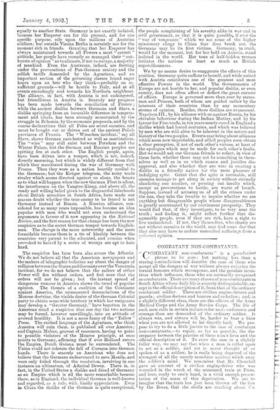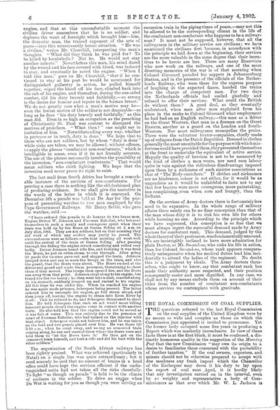COMBATANT NON-COMBATANTS.
" COMBATANT non-combatants" is a paradoxical phrase to be sure ; but nothing less than a staring contradiction will describe the case of those who accept all the dangers of war without always enjoying the formal honours which recompense, and the genuine incen- tives which influence, those who are outwardly recognised as combatants. There are many classes of non-combatants in South Africa whose daily life is scarcely distinguishable, ex- cept in the official description of it, from that of the ordinary combatant .soldier. There are civilian engine-drivers and guards ; civilian doctors and bearers and orderlies ; and, in a, slightly different class, there are the officers of the Army Medical Corps and the Army Service Corps. The life of such men calls in certain instances for morn endurance and courage than are demanded of the ordinary soldier. It always was, and always will be, harder to bear a blow when you are not allowed to hit directly back. We pro- pose to try to do a little justice to the case of combatant non-combatants,—to repair, as far as possible, the dis- crepancy between the practice of these iv en's lives and the official description of it. To state the case in a slightly fuller way, we may say that when a man is called upon to act as a soldier, and yet is never thought of or spoken of as a soldier, he is really being deprived of the strongest of all the merely mundane motives which sway the soldier's mind. We remember that Mr. Churchill gave an account of a civilian engine-driver who was wounded in the wreck of the armoured, train at Frere, and here, ready to one's hand, is a vivid enough presen- tation of the sense of this deprivation. We are to imagine that the train has just been thrown off the line by the Boers, that the shells are crashing about tl'e engine, and that at this uncomfortable moment the civilian driver remembers that he is no soldier, and deplores the want of foresight which brought him—him, the domestic man, the trained exponent of the arts of peace—into this unnecessarily heroic situation. " He was a civilian," writes Mr. Churchill, interpreting the man's thoughts. " What did they think he was paid for? To be killed by bombshells ? Not he. He would not stay another minute." Nevertheless this man, his mind dazed by the wound and his face covered with blood, was induced to stay. and eventually he saved the engine. " When I told this man," goes on Mr. Churchill, " that if he con- tinued to stay at his post he would be mentioned for distinguished gallantry in action, he pulled himself together, wiped the blood off his face, climbed back into the cab of his engine, and thereafter, during the one-sided combat, did his duty bravely and faithfully,—so strong is the desire for honour and repute in the human breast." We do not greatly care what a man's motive may be— even the lowest motive of the soldier is not despicable—so long as he does " his duty bravely and faithfully," as this man did. Even in so high an occupation as the preaching of Christianity St. Paul was content to disregard the motives of preachers. " What then ? " one might say in imitation of him. " Notwithstanding every way, whether in pretence or in truth, duty is done." We hope that to those who are not soldiers, but by whom "duty is done" while risks are taken, we may be allowed, without offence, to apply the phrase "combatant non-combatants," which is intelligible in sense, even if it be not literally accurate. The use of the phrase necessarily involves the possibility of the inversion, " non-combatant combatants." That would mean soldiers who shirk fighting. We hope that the inversion need never prove its right to exist.
The last mail from South Africa, has brought a remark- able instance of the services of non-combatants. For proving a case there is nothing like the old-fashioned plan of producing evidence. So we shall give the narrative in the words of the letter in which it is conveyed. On December 5th a parade was lield at De Aar for the pur- pose of presenting watches to two men employed by the Cape Government Railways. Sir Henry Settle, who gave the watches, said :— "I have ordered this parade to do honour to two brave men, Engine-Driver W. Johnson and Fireman Rabolini, who behaved themselves in such a manly and courageous spirit when their train was held up by the Boers at Ganna Siding at 2 a.m. on July 21st, 1901. They are not soldiers, but on that morning they did work of which any soldier may justly be proud. The circumstances were as follows :—On that morning all went well until the arrival of the train at Ganna Siding. After passing through the Siding the engine struck something and rolled very badly. Driver Johnson heard rifle fire, and thinking it was from the Boers, he put on extra steam to run through. After going 50 yards the vacuum gave out and stopped the train, Johnson jumped down and ran to warn the troops in the train, and also the guard, that the Beers were about. The Boers rushed at the driver and guard and made them prisoners, threatening to shoot them if they moved. The troops then opened fire, and the Boers ran away from that point. Johnson crept along to his engine, but found the fire too heavy ; he then went into a sluit, crawled along on his stomach, suddenly jumped up and rushed to his engine. All this time he was under fire. When be reached his engine he was again made prisoner, Scheepers being present. The latter ordered him to uncouple his engine, go full steam ahead, and then jump ar, leaving the engine to steam into Kron River by it-elt. 1 his he refused to do, and Scheepers threatened to shoot him. He told Scheepers that such an act would mean killing innocent people should the engine come in contact with another train. He also told him that the engine could not be moved as it was full of water. This was entirely due to the presence of mind of Fireman Rabolini, who had turned on the injector with that object Scheepers would not believe him, and he was taken on the veld and two guards placed over him. He was there till 3 30 BM, when he crept away, and Ewing an armoured train coming along, he ran and warned them where the Boers were and told them to let the Boors have it.' He then got on the armoured train himself, and took a rifle and did his best with the other soldiers."
The organisation of the South African railways has been rightly praised. What was achieved (particularly in Natal) on a single line was quite extraordinary; but it need scarcely be said that no amount of brains in a head office could have kept the services efficient if the undis- tinguished units had not taken all the risks cheerfully. To fight " as though on parade " is held to be the climax of coolness in the soldier. To drive an end : e when De Wet is waiting for you as though you were driving an excursion train in the piping times of,—may not this be allowed to be the corresponding climax in the life of the combatant non-combatant who happens to be a railway- man ? It must not be supposed, however, that all the railwaymen in the military service are civilians ; we have mentioned the civilians first because, in accordance with the principle we laid down at the beginning, their services are the more valuable in the same degree that their incen- tives to be heroic are less. There are many Reservists who now work on the railways, and one of the most diverting memories of the war is of that morning when Colonel Girouard paraded his sappers in Johannesburg Station, and in the presence of the officials of the Nether- lands Railway, who were there for the express purpose of laughing at the expected fiasco, handed the trains into the charge of competent men. For two days the Netherlands officials had smiled gleefully and refused to offer their services. What could the British do without them ? A good deal, as they eventually understood, when man after man explained from his place in the ranks to Colonel Girouard what employment he had had on an English railway,—this man as a driver on the Great Western, that man as a fireman on the Great Eastern, another as a guard on the London and South- Western. Nor must railwaymen monopolise the praise. There were the volunteer bearer-companies, chiefly made up of refugees from the Dutch Republics. Dressed in clothes generally the most unsuitable for the purpose with which mis- fortune could have provided them, theypresented themselves at the front to undertake the equivalent of active service. Happily the quality of heroism is not to be measured by the kind of clothes a man wears, nor need men labour quite in vain against the ridiculous disadvantage imposed upon them by a nickname of such sinister associations as that of " The Body-snatchers." If clothes and nicknames are no hindrance, colour is not either, for it would be as ungracious as it would be unfaithful to facts not to say that few bearers were more courageous, more painstaking, less complaining, even when sore and hungry, than the Indians.
On the services of Army doctors there is fortunately less need to be expansive. In the whole range of military affairs there surely can be no finer conception than that of the man whose duty it is to risk his own life for others while harming no one. According to the principle which we have expressed, this conception is so fine that we must always regret the successful demand made by Army doctors for combatant rank. This demand, judged by the whole theory of their profession, was fundamentally unsound. We are incorrigibly inclined to have more admiration for plain Doctor, or Mr. So-and-so, who risks his life in action, than for Colonel So-and-so, whose rank appears compara- tively unimpressive when his medical duties lead him inci- dentally to attend the ladies of the regiment. No doubt this is a judgment by ideals. The Army doctors them- selves, who ought to know, say that combatant rank has made their authority more respected, and their position consequently easier and more dignified. In any case, we shall not by any means exclude them on account of their titles from the number of combatant non-combatants whose services we contemplate with gratitude.







































 Previous page
Previous page